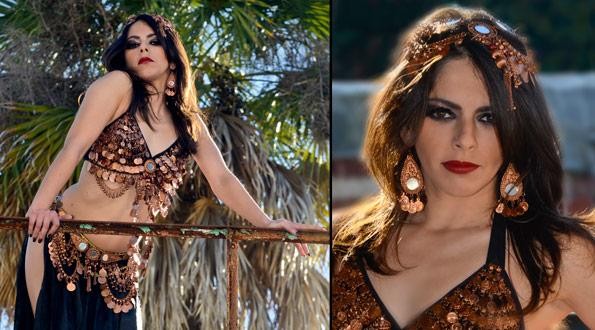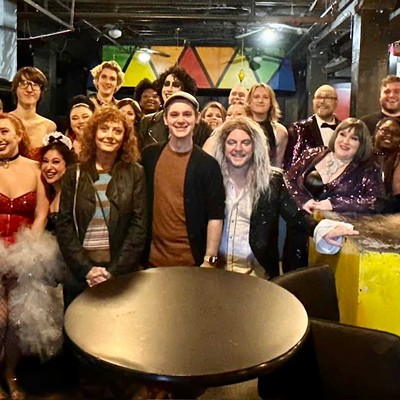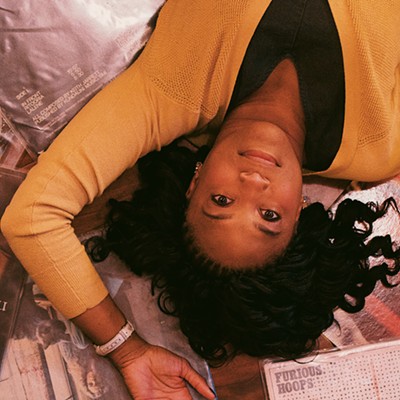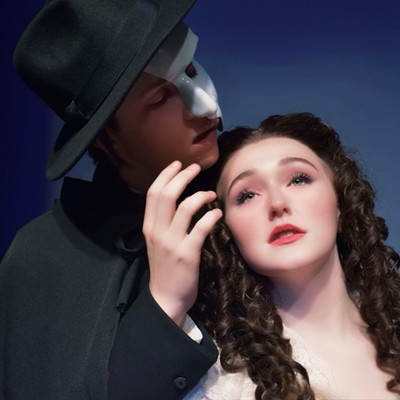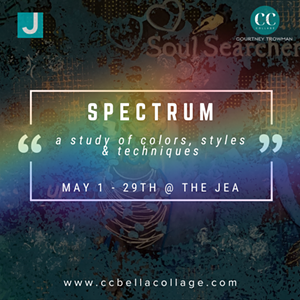Come opening night, all eyes will be on Alexandra Theodoropoulos.
The native New Yorker portrays the title character in Oscar Wilde’s Salome, and if you know anything about the Bible, you know the role requires a certain dance number.
Collective Face Theatre Ensemble director David I.L. Poole has imported the smoky–eyed Theodoropoulos for the company’s adaptation of Wilde’s original script, which includes the spellbinding Dance of the Seven Veils. In a drama to rival anything on late night cable, Salome seductively bargains for the fate of the prophet Iokannan (played by David Bonham) and drives the moral confusion. Connect’s Bill DeYoung also stars as King Herod, with Lynne Jones as his queen and mother of the biblical Lolita. The cast also includes Joshua Moser, April Hayes, Daniel Zuzalek, Brandall Jones and D’Amber Guice.
Salome opens this Friday, Nov. 30 at Muse Arts Warehouse.
It will be Theodoropoulos’ first stint onstage after a long absence. Far more down–to–earth than diva–like, the petite 28 year–old shared her insights about her character, her city and her “big, fat Greek family” over a cup of coffee this week.
Tell us how you ended up in Savannah for this production.
Alexandra Theodoropoulos: David I.L. Poole and I went to college together at SUNY Purchase; I was in his senior thesis play. After we graduated, we did a few more projects together until he relocated down South. He called me at the beginning of the year to ask if I would do Salome.
I had to ask him — and I’ve been kind of slapped on the hand for this — “Why did you want me?” I mean, I didn’t know if I could still do what I did back then. And he said, “You’re the only one I know in the world who has the chops to pull off this role.” I was extremely touched [laughs].
Why the long absence from the stage?
A.T.: The bulk of my theater experience was during and after college. Then I veered into the art world, where I’m a freelance artist and an art handler. I do my own work, but I also install art in exhibits and galleries. So I’m the white–gloved, silent, “Where do you want this?” person taking direction from the curator or the artist. I love it because I’m a blue collar worker in the art world. But I’ve never stopped being passionate about theater and I’m glad for the opportunity.
How have you prepared for the role the femme fatale? Apparently there’s quite a dance number involved…
A.T.: I’ve been working with a wonderful ballet dancer, Jacob Givens, who’s helping me choreograph the piece. David has crafted the most beautiful veils that I’ll be using in the dance, to be disposed of one by one…
Will you go the Full Monty?
A.T.: [smiling] It will be tastefully done. We went through all kinds of videos and versions for stage and film, and people have taken it in a lot of different directions, not all of them ending in nudity. It’s something that there is no standard for, so there’s a lot of room for creative interpretation.
What else does the character bring up for you?
A.T.: Salome is a strong–willed woman who’s living in a really abrasive, archaic man’s world. The question of whether she’s a victim or a vixen, her heart of gold or stone, that’s up for the individual to decide. The kind of relationship Salome has with Iokannan — who is John the Baptist — it’s not what you would typically expect. She is a femme fatale, but it’s kind of happenstance, given her beauty and her power as a princess of Judaea. As a woman, she’s definitely fallible and she definitely has her weakness, and Iokannan is her weakness.
Oscar Wilde wrote Salome in French during the late 1800s. What are the enduring parts for the audience to enjoy about it, besides coming to see you dance?
A.T.: What’s wonderful is that David has adapted the play, trying to contemporize the language so the audience isn’t caught up in the “thee”s and “thou”s, this kind of stodgy language that could make people’s eyes roll, or just confuse them. Or worse, make them feel detached.
With this adapted version of the play, we feel like we’ve rid the piece of the language distractions and distilled it down to the meat and potatoes of what is actually happening: What are the relationships and why are they important? What are the themes being tackled here, like taboo, crossing lines, being judged, being objectified?
Have you been to Savannah before?
A.T.: No, this is my first real experience of the South. I’m absolutely captivated. I mean the Spanish moss…it’s constantly ethereal. Everything seems like it’s from a slightly earlier time. The smaller scale of things…the richness in the architecture…the friendliness of the people… [trails off wistfully.]
Where I live in New York City, in Queens, it can be a hard place to exist. It’s certainly a shark tank if you’re a kind–hearted little guppy. To come here and meet all the cast members and the theater company, it’s a mini–home that they’ve welcomed me into. I get to pretend I live in this toned down community where people have a chance to flourish. They’re not just constantly combatting the wild energies of the “Greatest City in the World” [makes quote signs with her fingers].
Do you think you’ll come back to do another production?
A.T.: I live in one giant question mark. I am a tumbleweed…I’m just working through this time in my life the best I can. I have a big, fat Greek family back in New York: I’m one of five children, and my twin sister just had her first baby. That makes all four of my siblings married with children, and I’m the single spinster enjoying everything they can’t anymore [laughs]. So maybe, if the opportunity presents itself again.
Have you been rebitten by the theater bug hard enough to pursue it again?
A.T.: Anytime any of my artist friends needed help with a project, I was there, but this is the first production where there are lines to be memorized, blocking to be done. If I were to continue to pursue theater full force in the city, this is a much needed exercise.
It’s a struggle thinking that New York is where you need to be as artist if you want to be serious, but you can throw everything you have into a void and it’s just sucked in. It’s an elitist frame of mind that I’m working to rid myself of. I love having the ability to try and achieve success in the city, but if you’re not happy, if your heart’s crying out for a friendly face and someone to call you “ma’am”…
It’s been so inspiring to meet the people in the theater community here and see how much they devote to making their lives and work relevant. It’s ideal for me here, people are so friendly. I’ve never been called “ma’am” more in my life!
Salome Parlor Play presented by the Collective Face Theatre Ensemble
When: Nov. 30, Dec. 1, 7 and 8 at 8 p.m.; Dec. 1, 8 and 9 at 3 p.m.
Where: Muse Arts Warehouse, 703D Louisville Rd.
Tickets: $15
Info: 912.232.0018

